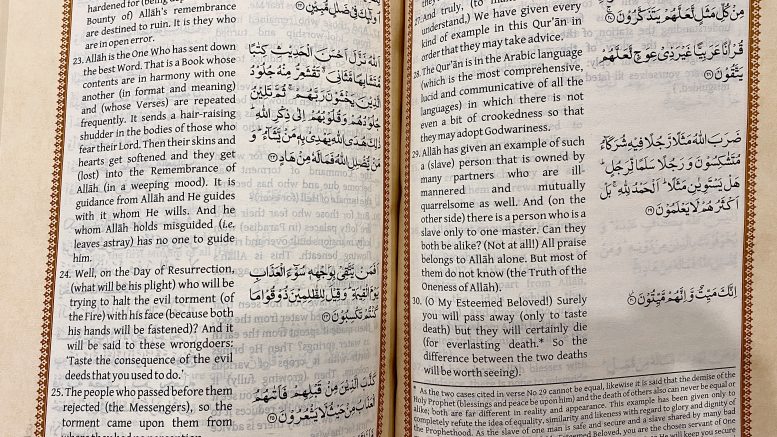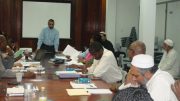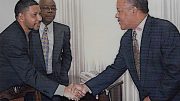Bridgetown, Barbados: For the past 1400 years, a practice has been established in Muslim communities throughout the world. That is the practice of memorizing the entire scripture of Islam, the Holy Qur’an, from cover to cover in the Arabic language.
This practice is perhaps unique in the world today and has survived over centuries due to the immense importance Muslims place on the Holy Qur’an revealed to the Prophet Muhammad in the 7th century after Jesus, peace be upon them both.
History records that as the revelations came to the Prophet Muhammad, peace be upon him, he and his companions would commit the verses to memory.
The one who memorizes the entire Qur’an is called a ‘hafiz’, an Arabic word that means memorizer. The below account explains:
“The Arabs preserved their histories, genealogies, and poetry by memory alone. When Muhammad proclaimed the verses later collected as the Qur’an, his followers naturally preserved the words by memorizing them.
Early accounts say that the literate Muslims also wrote down such verses as they heard them. However, the Arabic writing of the time was an incomplete script, that did not include vowel markings or other diacritics needed to distinguish between words.
Hence if there was any question as to the pronunciation of a verse, the memorised verses were a better source than the written ones. The huffaz (plural of hafiz) were also highly appreciated as reciters, whose intoned words were accessible even to the illiterate. Memorisation required no expensive raw materials (in an age when there was no paper in the Muslim world, only vellum).
“Memorisation was also considered more secure—a manuscript could easily be destroyed, but if the Qur’an was to be memorised by many huffaz, it would never be lost. Even after Caliph Uthman ibn Affan collected and organised the Qur’an circa 650-656 CE, recitation (from memory) of the Qur’an was still honoured and encouraged.
“Huffaz are highly respected within the Islamic community. They are privileged to use the title “Hafiz” before their names. Most huffaz have studied as children in special Islamic schools instructed in tajwid (rules of recitation) and vocalisation as well as committing the Qur’an to memory.
To give some idea as to the nature of this undertaking: The Qur’an is divided into 114 Surahs (chapters), containing 6,236 verses (comprising some 80,000 words or 330,000 individual characters).”
Ramadan, the month which Muslims are presently observing, and which is also called the month of the Quran, is especially significant for the huffaz.
Every night in special additional prayers at the mosques a portion is recited from the Quran by the memorisers. They start at Chapter 1 on the first night of Ramadan reading from memory a portion and ending with the last chapter usually sometime during the last ten nights of the month.
Muslims in Barbados over the years have benefited from this practice every year during Ramadan. The Muslim community of this small island, although few in number (approximately 3000) now has in its midst over 100 huffaz or memorisers, with scores of young persons enrolled in hifz (memorisation) classes at various Islamic schools and several others studying overseas.
This practice is not new among the Muslim community whose majority traces their roots to the villages of Gujarat, India. Muslims there look strongly to this tradition of having at least one hafiz/memoriser in the family as a source of blessings and pride. Sabir Nakhuda in his book, Bengal to Barbados, noted that among the first Gujarati Muslims to arrive in Barbados in 1929 was a hafiz, Suleman Kasooji.
His knowledge of the Quran and the fact that he was a hafiz made him the leader of the prayers and teacher among the early Muslims to Barbados. But the history of huffaz in our Caribbean region goes even further back in time.
Back to the enslavement of Africans from West Africa forcibly brought to the Americas and the Caribbean to slave on plantations. Several accounts by historians paint a picture of Africans who were learned men and women, scholars of their time and religious scholars of the Islamic faith. Many had knowledge of the Arabic language, with the ability to speak, write and recite verses from the Holy Quran.
These accounts accurately portray the conditions that did indeed exist in many parts of West Africa at the time of the trans-Atlantic slave trade and which is still very much in practice today. The practice of education and Islamic education especially among Muslim tribes in Africa.
Rudolph Ware in his book ‘The Walking Quran: Islamic Education, Embodied Knowledge, and History in West Africa’ documents the profound significance of Qur’an schools for West African Muslim communities.
Such schools peacefully brought Islam to much of the region, becoming striking symbols of Muslim identity. Ware shows how in Senegambia the schools became powerful channels for African resistance during the eras of the slave trade and colonisation.
Omar Ibn Said is one of those iconic enslaved African Muslims brought to the Americas. Born to a wealthy family in West Africa around 1770, Omar Ibn Said was abducted and sold into slavery in the United States, where he came to the attention of a prominent North Carolina family after filling “the walls of his room with piteous petitions to be released, all written in the Arabic language,” as one local newspaper reported
Omar ibn Said’s “The Life of Omar Ibn Said”, written by Himself” (1831) occupies a unique position within the slave narrative tradition. As the only surviving Arabic autobiography written by a slave from the United States, the Life juxtaposes a religious exegesis based on the textual authority of the Qur’an with a first-person account of Omar’s life. The manuscript exposed in particular Omar’s literacy in Arabic and his religious training.
It is also recorded that Benjamin Larten, a Mandingo enslaved in Jamaica, had written the Holy Quran from memory. And in Barbados, an account of an enslaved with knowledge of the Arabic language was found in the diaries of a Moravian missionary stationed at Mount Tabor Plantation.
Memorisers have been on our shores for decades and continue to find a place in our faith practices up to the present. Barbados among the countries of the Caribbean can be proud of keeping alive a faith tradition that spans several centuries and a diversity of people. In fact, prior to Covid, Muslims in Barbados had the distinct advantage of sending huffaz to other parts of the Caribbean and the world to lead prayers during this month of fasting.
Ramadan certainly brings to light the practice and culture of memorising the Holy Quran that has taken root among the Muslims of Barbados and also importantly reminded us of the long history that memorisers of the Quran have been part and parcel of our region.
Suleiman Bulbulia is a Justice of the Peace; Secretary of the Barbados Muslim Association; Muslim Chaplain at the U.W.I, Cave Hill Campus and Chair, Barbados Childhood Obesity Prevention Coalition. This article was first published in Barbados Today on the 5th May 2021 Online Edition.




